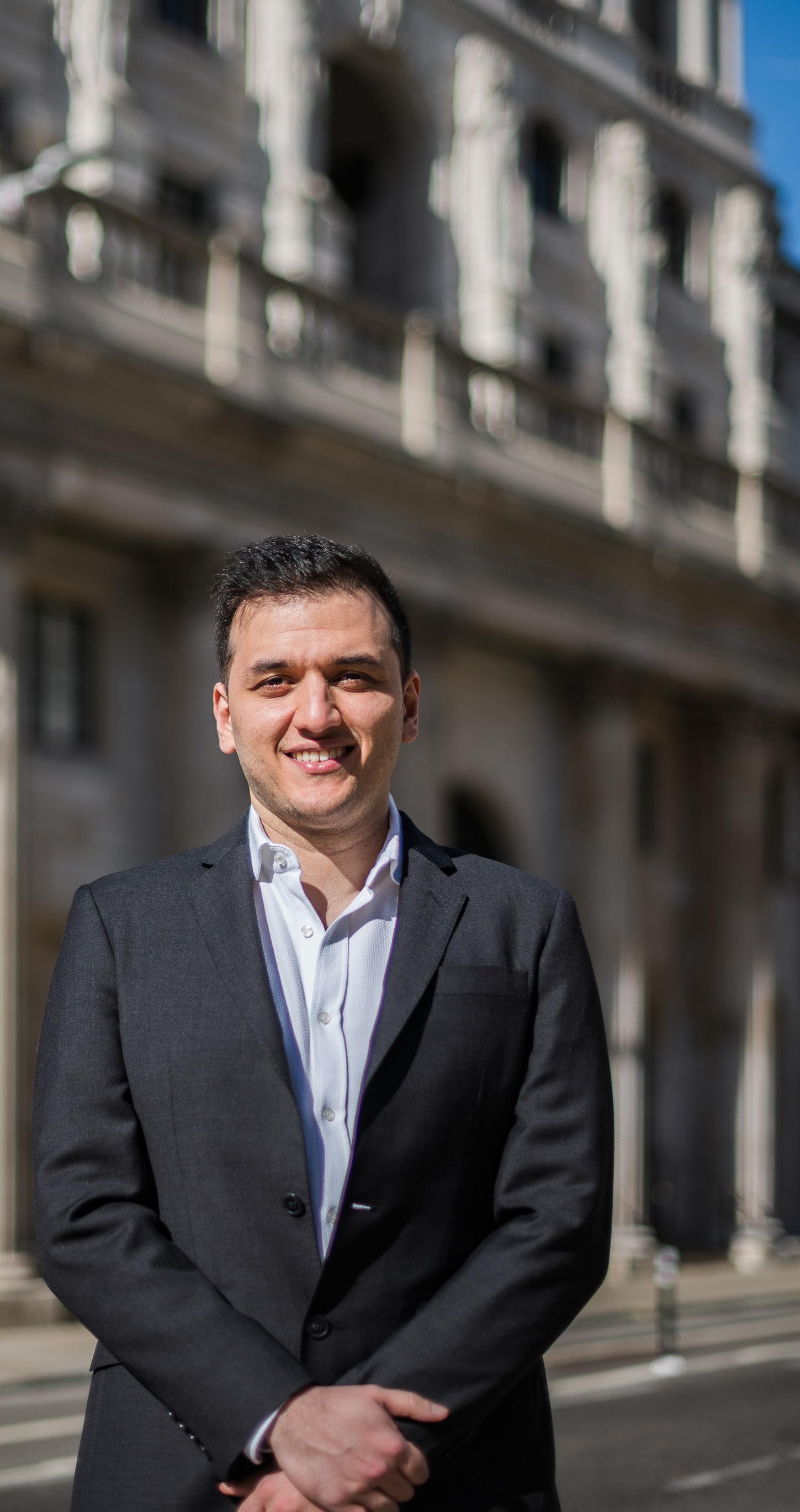
7 minute read
FX Cubic
by PaulGC
EGE KOZAN
Co-Founder and CEO of FX Cubic
Advertisement
Q How did you begin in the financial markets?
I was introduced to financial markets at a very early age, as this is what my family has been doing for a long time. I was slowly and naturally trained in both financial markets and how related technology works throughout my early school days, which shaped my future from very early on. Having this opportunity early on inspired a very keen interest in the subject for me. To such an extent that I used to code trading algorithms, albeit relatively simple ones, and back-test these strategies as a hobby in high school, which was both a fun and highly effective way to learn hands-on about financial markets and their characteristics.
Q What tips can you give an entrepreneur in beginning a tech business?
I believe that the most important thing to get right from the outset is having the right people on board. Having a great team around you will inevitably result in most other aspects of the business taking care of themselves to a certain degree. The synergy between team members and departments is also vital. You could be doing something that is not necessarily a unique business whereby competition is cut-throat. Still, if you simply provide that same service with more concise communication and superior support to your clients, it will make a difference and can still make your offering stand out. Of course, having a solid and reliable product is imperative too. Still, to a certain degree, that also can come from having good people all around, from core developers to the sales team and to support members. I would recommend dedicating time to form this core team before starting anything else and not rushing into anything without it. Once this is done, a lot of other things will come organically.
Q Would you advise up and coming entrepreneurs to look for outside financing for an idea?
I would say definitely. It is very hard to get any business off the ground effectively without financing these days. Even if you are not going to spend a lot on marketing, there are invariably many hidden costs that you cannot plan for initially. Outside financing also has benefits other than the financing itself. It can help with connections, both in terms of finding clients and also finding quality team members. So overall, I think it is a very positive thing as long as expectations are aligned, and each party is able to bring added value to the venture. Convincing investors is a job on its own, though. It is essential to understand your business and the market opportunity clearly so you can make a solid and realistic pitch to any potential investors. It is worth spending a good amount of time studying the correct ways to do this and finding the right kind of investors that are most suitable for the proposed business. It can take a lot of effort to do this, so one needs to be careful not to waste time and learn the correct ways first wherever possible.
Q When was the FXCubic idea conceived and, by who?
FXCubic idea was conceived about ten years ago, initially by my father. He has been involved in fintech together with his partner for a very long time. An FX bridging/aggregation tech opportunity presented itself initially from a client that was in need of such a service. Back then, there were many bridging products out there that were inherently unstable and had very limited functionality, especially with regards to risk management and advanced order routing capabilities. Having so much experience with financial technology, the team decided they could build a new product that would be much more comprehensive and add much greater value to said client, as opposed to using one of the existing tech vendors’ products. After delivering this proprietary technology suite in its first format to the client in question, the feedback we received was excellent, so we decided to offer this to some other close clients, which was also very well received. From here on, it was clear that we had something of real value and decided to invest more money, time, and focus on this in earnest. Thus, FXCubic was born!
Q Do you see the future for FX brokerages, where they own their own technology?
In my opinion, it is very tricky for an FX brokerage
to have their own bridging/aggregation technology. It is both a costly and complex undertaking to build even a basic bridging and aggregation tool, not to mention the large amount of manpower required to further develop and support such a product. Many facets must be understood prior to building such technology successfully that simply cannot be picked up prior to coding it. There is a huge amount of trial and error involved that, quite frankly, will end up in spiralling costs, resources, and lost time, and even then, the end product will be unlikely to be as good as even an average offering from a 3rd party. In addition, it is not just a case of building the technology and letting it run; it must also be constantly maintained, upgraded, and supported correctly to ensure it works seamlessly and has the latest functionality to work efficiently under ever-changing market conditions. The inherent complexity of this kind of technology is the main reason why a lot of the tools that exist on the market are unstable and un-sophisticated in terms of their functionality. Building such a tool requires an enormous investment in a knowledgeable and experienced development team, as well as a very advanced testing environment and regime coupled with a highly efficient and reactive support team, such as we have at FXCubic. So overall, it simply is not worth the investment for a broker to build something internally. It is fair to say that the most significant brokers do have the money and resources to potentially build their own bridging/aggregation technology. However, even then, it does not make sense for them to take focus away from their core business and create all that additional work and headache by building out their in-house tech. When partnering with a trusted

provider such as FXCubic that breathes, eats and, sleeps FX technology, it will almost certainly deliver a much more robust and advanced technology that will meet current and future needs without significant ongoing investment and added operational complexity for the broker. Finding the correct tech partner will always be a better approach.
Q Why did you decide to make bridge technology in what appears to be a very crowded market?

Indeed, it is a crowded market. However, as alluded to above, it was clear to us from the outset that current technology that exists on the market is simply not addressing how brokers need to operate in today’s market. Some of the largest tech vendors’ offerings lack sophistication and rich functionality to optimise a broker’s true potential. In addition to pure functionality inefficiencies, we also saw a significant issue regarding how the current products were supported from a customer service point of view. This is and has been, a common complaint with every vendor for many years, so we saw another opportunity here to address this by delivering superior levels of personal support to all our clients that makes us stand out. Another key point we wanted to solve, was the complexity of how the existing front ends are designed. In our opinion, advanced technology should be intuitive to operate, so designing next-generation technology and functionality was not enough. We have focused hugely on the user interface, so anyone from a junior dealer to the head of brokerage can quickly understand and configure all the settings easily and optimize operational efficiency and performance. In conclusion, we saw many areas that were lacking and could be seriously improved upon. We knew that by considering these issues and utilizing our extensive experience into the financial markets and technology, and intimate knowledge of how a broker operates, we could build the most relevant and up to date tools and features. Resulting in improved risk-adjusted performance and operational efficiency for any brokerage, no matter who their incumbent tech provider is. This belief has been born into reality now as we have delivered everything we intended to and are enjoying rapid growth and becoming the default technology vendor of choice across the market. We certainly will not stand still, though, and are about to announce in the coming weeks another ‘game-changing’ addition to our technology, so watch out for this.
Q Why did you decide to have London as your centre of operations?
London can be considered the centre of the modern world, and it is home to one of the earliest financial markets. Having London as your centre of operations brings trust and reliability to your brand, and you also attract good talent to your team. So, it was a perfectly natural choice to base our operations here.










